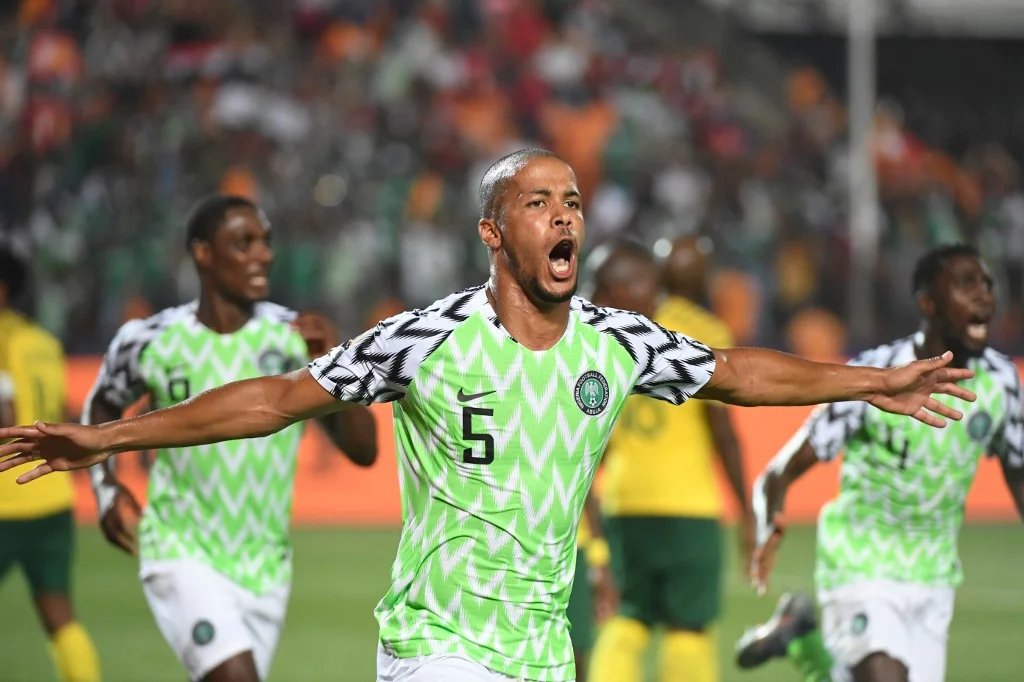Super Eagles vice-captain William Troost-Ekong has made a passionate plea to the Nigeria Football Federation (NFF) to ensure the pitch at Moshood Abiola National Stadium in Abuja is in top condition for the crucial 2022 FIFA World Cup playoff second leg against Ghana’s Black Stars on March 29, 2022. The appeal, voiced during a virtual meeting on February 15, 2022, underscores the importance of the playing surface for Nigeria’s performance in the high-stakes encounter.
Context of the Request
Nigeria and Ghana, fierce West African rivals, faced off in a two-legged playoff to secure one of Africa’s five spots for the 2022 World Cup in Qatar. The first leg, played on March 25, 2022, at Baba Yara Stadium in Kumasi, ended in a goalless draw, making the return leg in Abuja decisive. Ekong, a Watford defender likely to captain the Super Eagles, emphasized the need for a “pristine” pitch, drawing from the team’s positive experience at the Roumdé Adjia Stadium in Garoua during the 2021 Africa Cup of Nations (AFCON). “We loved the pitch in Garoua, and it helped us play some good football,” Ekong said, expressing hope that Abuja’s stadium would match that standard.
The Moshood Abiola Stadium, recently renovated under the Adopt-a-Pitch Public-Private Partnership with Dangote Industries, features modern amenities like nursery beds, two digital scoreboards, 24 sprinklers, and a two-year maintenance contract. Despite these upgrades, Ekong’s request suggests concerns about the pitch’s readiness for competitive play, as the current Super Eagles squad had not played an official match there, having primarily used venues like Godswill Akpabio Stadium in Uyo, Stephen Keshi Stadium in Asaba, Samuel Ogbemudia Stadium in Benin, and Teslim Balogun Stadium in Lagos.
Outcome and Pitch Conditions
Despite Ekong’s plea, the match on March 29, 2022, revealed that the pitch at Moshood Abiola Stadium was not in the desired condition. Reports from the game noted that the surface was subpar, potentially impacting Nigeria’s performance. Ghana took an early lead through Thomas Partey’s 11th-minute goal, aided by a goalkeeping error from Francis Uzoho. Ekong equalized with a 22nd-minute penalty, but Nigeria failed to find a winning goal, resulting in a 1-1 draw. Due to the away goals rule, Ghana advanced to the World Cup, while Nigeria missed qualification for the first time since 2006.
The condition of the pitch drew criticism post-match, with analysts suggesting it hindered Nigeria’s ability to execute their attacking style. Fisayo Dairo of ACLsports noted, “The Super Eagles lacked urgency in the second half,” possibly exacerbated by the less-than-ideal surface. Fans and commentators also pointed to broader issues, including the NFF’s organizational challenges, as contributing factors to Nigeria’s elimination.
Broader Implications
Ekong’s call for a flawless pitch highlights a critical aspect of football infrastructure often overlooked in high-stakes matches. The quality of the playing surface can significantly influence a team’s performance, particularly for Nigeria, known for its fast-paced, technical style. The failure to deliver an optimal pitch may have compounded other challenges, such as tactical decisions and player form, in the crucial playoff.
The incident also underscores ongoing concerns about stadium management in Nigeria. Despite the renovations, the NFF faced scrutiny for not meeting Ekong’s expectations, reflecting broader issues with preparation and maintenance. Social media reactions post-match included sentiments like, “NFF needs to get its act together—pitch issues and poor planning cost us,” highlighting fan frustration.
Critical Reflection
While the renovated Moshood Abiola Stadium represented progress in Nigeria’s football infrastructure, Ekong’s pre-match concerns and the subsequent pitch conditions suggest gaps in execution. The NFF’s partnership with Dangote Industries was a step toward modernization, but the failure to deliver a “Garoua-like” pitch for such a pivotal game raises questions about oversight and prioritization. The contrast between Ekong’s proactive request and the outcome reflects a missed opportunity to maximize Nigeria’s home advantage against a rival like Ghana.
This episode also points to the need for consistent investment in and maintenance of football facilities across Africa, where pitch quality often varies. The NFF’s acknowledgment of the issue post-match, coupled with their commitment to “give new energy to the Super Eagles,” suggests a recognition of the need for improvement, but tangible actions remain critical for future success.






